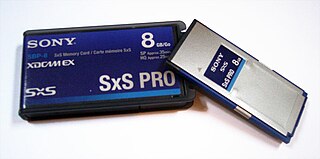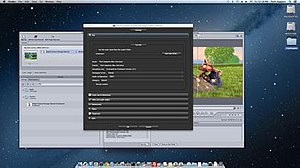
Digital cinema refers to the adoption of digital technology within the film industry to distribute or project motion pictures as opposed to the historical use of reels of motion picture film, such as 35 mm film. Whereas film reels have to be shipped to movie theaters, a digital movie can be distributed to cinemas in a number of ways: over the Internet or dedicated satellite links, or by sending hard drives or optical discs such as Blu-ray discs.

Serial digital interface (SDI) is a family of digital video interfaces first standardized by SMPTE in 1989. For example, ITU-R BT.656 and SMPTE 259M define digital video interfaces used for broadcast-grade video. A related standard, known as high-definition serial digital interface (HD-SDI), is standardized in SMPTE 292M; this provides a nominal data rate of 1.485 Gbit/s.

1080p is a set of HDTV high-definition video modes characterized by 1,920 pixels displayed across the screen horizontally and 1,080 pixels down the screen vertically; the p stands for progressive scan, i.e. non-interlaced. The term usually assumes a widescreen aspect ratio of 16:9, implying a resolution of 2.1 megapixels. It is often marketed as Full HD or FHD, to contrast 1080p with 720p resolution screens. Although 1080p is sometimes referred to as 2K resolution, other sources differentiate between 1080p and (true) 2K resolution.
Digital Cinema Initiatives, LLC (DCI) is a consortium of major motion picture studios, formed to establish specifications for a common systems architecture for digital cinema systems.

SxS (S-by-S) is a flash memory standard compliant to the Sony and SanDisk-created ExpressCard standard. According to Sandisk and Sony, the cards have transfer rates of 800 Mbit/s and burst transfer rate of up to 2.5 Gbit/s over the ExpressCard's PCI Express interface. Sony uses these cards as the storage medium for their XDCAM EX line of professional video cameras.
Uncompressed video is digital video that either has never been compressed or was generated by decompressing previously compressed digital video. It is commonly used by video cameras, video monitors, video recording devices, and in video processors that perform functions such as image resizing, image rotation, deinterlacing, and text and graphics overlay. It is conveyed over various types of baseband digital video interfaces, such as HDMI, DVI, DisplayPort and SDI. Standards also exist for the carriage of uncompressed video over computer networks.

4K resolution refers to a horizontal display resolution of approximately 4,000 pixels. Digital television and digital cinematography commonly use several different 4K resolutions. In television and consumer media, 3840 × 2160 with a 16:9 aspect ratio is the dominant 4K standard, whereas the movie projection industry uses 4096 × 2160.
A Digital Cinema Package (DCP) is a collection of digital files used to store and convey digital cinema (DC) audio, image, and data streams.

HDBaseT is a consumer electronic (CE) and commercial connectivity standard for transmission of uncompressed ultra-high-definition video, digital audio, DC power, Ethernet, USB 2.0, and other control communication over a single category cable up to 100 m (328 ft) in length, terminated using 8P8C modular connectors. The conductors, cable, and connectors are as used in Ethernet networks, but are not otherwise exchangeable. HDBaseT technology is promoted and advanced by the HDBaseT Alliance.
GoPro, Inc. is an American technology company founded in 2002 by Nick Woodman. It manufactures action cameras and develops its own mobile apps and video-editing software. Founded as Woodman Labs, Inc, the company is based in San Mateo, California.

Doremi Laboratories, Inc., often shortened to Doremi Labs, was a developer and manufacturer of digital servers and format converters for the digital cinema, broadcast, post-production and professional A/V markets. It was established in 1985 in Burbank, California, United States, and was absorbed into Dolby Laboratories in a 2014 acquisition.
XAVC is a recording format that was introduced by Sony on October 30, 2012. XAVC is a format that will be licensed to companies that want to make XAVC products.

CineAsset was a complete mastering software suite by Doremi Labs that could create and playback encrypted and unencrypted DCI compliant packages from virtually any source. CineAsset included a separate "Editor" application for generating Digital Cinema Packages (DCPs). CineAsset Pro added the ability to generate encrypted DCPs and Key Delivery Messages (KDMs) for any encrypted content in the database. It has since been discontinued, along with CineAsset Player.
Apple ProRes is a high quality, "visually lossless" lossy video compression format developed by Apple Inc. for use in post-production that supports video resolution up to 8K. It is the successor of the Apple Intermediate Codec and was introduced in 2007 with Final Cut Studio 2. Much like the H.26x and MPEG standards, the ProRes family of codecs use compression algorithms based on the discrete cosine transform (DCT). ProRes is widely used as a final format delivery method for HD broadcast files in commercials, features, Blu-ray and streaming.

CinePlayer is a software based media player used to review Digital Cinema Packages (DCP) without the need for a digital cinema server by Doremi Labs. CinePlayer can play back any DCP, not just those created by Doremi Mastering products. In addition to playing DCPs, CinePlayer can also playback JPEG2000 image sequences and many popular multimedia file types.

The Panasonic Lumix DMC-GH4 is a Micro Four Thirds System digital still and video camera originally released in May 2014. At the time of its release, the GH4 was notable for being the world's first Mirrorless interchangeable-lens camera with 4K Video recording capability.
A Media Block or Integrated Media Block (IMB) is a component in a digital cinema projection system. Its purpose is to convert the Digital Cinema Package (DCP) content into data that ultimately produces picture and sound in a theater in compliance with DCI anti-piracy encryption requirements.
The Blackmagic URSA is a digital movie camera developed and manufactured by Blackmagic Design, released on August 8, 2014. It is the first camera to be user-upgradeable for additional equipment manufactured by Blackmagic and other third-party makers.
The Sony Xperia PRO-I is an Android smartphone manufactured by Sony. Designed to be the new professional flagship of Sony's Xperia series, the phone was announced on October 26, 2021.










